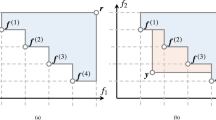Abstract
Multi-objective optimization problems are commonly encountered in real world applications. In some applications , where the gradient information of the objective functions is available, it is natural to consider a gradient-based multi-objective optimization algorithm for relatively high convergence speed and stability. In this chapter, we consider a recently proposed gradient-based approach, called the hypervolume indicator gradient ascent method. It is designed to maximize the hypervolume indicator in the steepest direction by calculating its gradient field with respect to decision vectors. The hypervolume indicator gradient derivation will be covered in this chapter. Despite the elegance of this approach, a critical issue arises when applying the gradient computation for some of the decision vectors: the gradient at a dominated point is either zero or undefined, which restricts the usage of this approach. To remedy this, five methods are proposed to provide a search direction for dominated points (at which the hypervolume indicator gradient fails to do so). These five methods are devised for the bi-objective optimization case and are illustrated in detail. In addition, a thorough empirical study is carried out to investigate the convergence behavior of these five methods. The combination of the hypervolume indicator gradient and the proposed five methods constitute a novel gradient-based, bi-objective optimization algorithm, which is validated and benchmarked. The benchmark results show interesting performance comparisons among the five proposed methods.
Access this chapter
Tax calculation will be finalised at checkout
Purchases are for personal use only
Similar content being viewed by others
References
Beume, N., Fonseca, C.M., López-Ibáñez, M., Paquete, L., Vahrenhold, J.: On the complexity of computing the hypervolume indicator. IEEE Trans. Evol. Comput. 13(5), 1075–1082 (2009)
Beume, N., Naujoks, B., Emmerich, M.: SMS-EMOA: multiobjective selection based on dominated hypervolume. Eur. J. Oper. Res. 181(3), 1653–1669 (2007)
Deb, K., Agrawal, S., Pratap, A., Meyarivan, T.: A fast elitist non-dominated sorting genetic algorithm for multi-objective optimization: NSGA-II. Lect. Notes Comput. Sci. 1917, 849–858 (2000)
Ehrgott, M.: Multicriteria Optimization. Springer Science & Business Media, Berlin (2006)
Emmerich, M., Beume, N., Naujoks, B.: An EMO algorithm using the hypervolume measure as selection criterion. In: 2005 International Conference, March 2005, pp. 62–76. Springer (2005)
Emmerich, M., Deutz, A.: A family of test problems with pareto-fronts of variable curvature based on super-spheres. In: MCDM 2006, Chania, Greece (2006)
Emmerich, M., Deutz, A.: Test Problems based on Lame Superspheres. In: Obayashi, S., Deb, K., Poloni, C., Hiroyasu, T., Murata, T. (eds.) EMO 2007. LNCS, vol. 4403, pp. 922–936. Springer, Heidelberg (2007)
Emmerich, M., Deutz, A.: EVOLVE—A bridge between probability, set oriented numerics, and evolutionary computation III. In: Schuetze, O., Coello-Coello, C.A., Tantar, A.A., Tantar, E., Bouvry, P., Moral, P.D., Legrand, P. (eds.) Time Complexity and Zeros of the Hypervolume Indicator Gradient Field, pp. 169–193. Springer, Heidelberg (2014)
Emmerich, M., Deutz, A., Beume, N.: Gradient-based/Evolutionary relay hybrid for computing pareto front approximations maximizing the S-metric. In: Proceedings of the 4th International Conference on Hybrid Metaheuristics, HM 2007, pp. 140–156. Springer, Heidelberg (2007)
Fliege, J., Svaiter, B.F.: Steepest descent methods for multicriteria optimization. Math. Methods Oper. Res. 51(3), 479–494 (2000)
Fonseca, C.M., Paquete, L., López-Ibánez, M.: An improved dimension-sweep algorithm for the hypervolume indicator. In: IEEE Congress on, Evolutionary Computation, 2006, CEC 2006, pp. 1157–1163. IEEE (2006)
Hillermeier, C.: Generalized homotopy approach to multiobjective optimization. J. Optim. Theory Appl. 110(3), 557–583 (2001)
Igel, C., Hansen, N., Roth, S.: Covariance matrix adaptation for multi-objective optimization. Evol. Comput. 15(1), 1–28 (2007)
Knowles, J.D., Corne, D.W., Fleischer, M.: Bounded archiving using the lebesgue measure. In: The 2003 Congress on, Evolutionary Computation, 2003, CEC 2003, vol. 4, pp. 2490–2497. IEEE (2003)
Lara, A., Schütze, O., Coello, C.A.C.: On gradient-based local search to hybridize multi-objective evolutionary algorithms. In: EVOLVE-A Bridge between Probability, set Oriented Numerics and Evolutionary Computation, pp. 305–332. Springer (2013)
López, A.L.: Using Gradient Based Information to Build Hybrid Multi-objective Evolutionary Algorithms. Ph.D. thesis, Computer Science Department, CINVESTAV-IPN (2012)
Mishra, S.K., Ganapati, P., Meher, S., Majhi, R.: A fast multiobjective evolutionary algorithm for finding wellspread Pareto-optimal solutions. In: KanGAL Report No. 2003002, lndian Institute of Technology Kanpur, Citeseer (2002)
Schütze, O.: Set Oriented Methods for Global Optimization. Ph.D. thesis, University of Paderborn, Paderborn, Germany (2004)
Schütze, O., Martín, A., Lara, A., Alvarado, S., Salinas, E., Coello, C.A.C.: The directed search method for multi-objective memetic algorithms. Comput. Optim. Appl. 63(2), 305–332 (2016)
Sosa Hernández, V.A., Schütze, O., Emmerich, M.: EVOLVE—A Bridge between Probability, Set Oriented Numerics, and Evolutionary Computation V, chap. Hypervolume Maximization via Set Based Newton’s Method, pp. 15–28. Springer, Cham (2014)
Yildiz, H., Suri, S.: On klee’s measure problem for grounded boxes. In: Proceedings of the Twenty-eighth Annual Symposium on Computational Geometry, pp. 111–120. ACM (2012)
Zitzler, E., Künzli, S.: Indicator-based selection in multiobjective search. In: Parallel Problem Solving from Nature-PPSN VIII, pp. 832–842. Springer (2004)
Zitzler, E., Laumanns, M., Thiele, L.: SPEA2: Improving the Strength Pareto Evolutionary Algorithm, Technical report (2001)
Zitzler, E., Thiele, L.: Multiobjective optimization using evolutionary algorithms comparative case study. In: Parallel Problem Solving from Nature-PPSN V, pp. 292–301. Springer (1998)
Zitzler, E., Thiele, L., Laumanns, M., Fonseca, C.M., Da Fonseca, V.G.: Performance assessment of multiobjective optimizers: an analysis and review. IEEE Trans. Evol. Comput. 7(2), 117–132 (2003)
Acknowledgments
The authors would like to thank for the support from NWO PROMIMOOC project.
Author information
Authors and Affiliations
Corresponding author
Editor information
Editors and Affiliations
Rights and permissions
Copyright information
© 2017 Springer International Publishing Switzerland
About this chapter
Cite this chapter
Wang, H., Ren, Y., Deutz, A., Emmerich, M. (2017). On Steering Dominated Points in Hypervolume Indicator Gradient Ascent for Bi-Objective Optimization. In: Schütze, O., Trujillo, L., Legrand, P., Maldonado, Y. (eds) NEO 2015. Studies in Computational Intelligence, vol 663. Springer, Cham. https://doi.org/10.1007/978-3-319-44003-3_8
Download citation
DOI: https://doi.org/10.1007/978-3-319-44003-3_8
Published:
Publisher Name: Springer, Cham
Print ISBN: 978-3-319-44002-6
Online ISBN: 978-3-319-44003-3
eBook Packages: EngineeringEngineering (R0)




